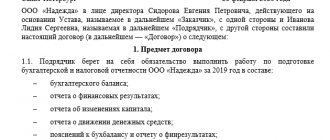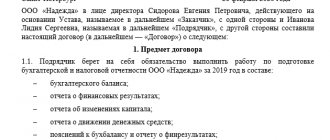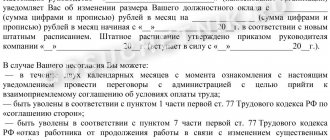From the article you will learn:
Financial liability means the obligation to compensate for losses caused by the actions of the guilty person. For example, damage can be expressed both in non-payment of wages and in shortfalls identified during the audit. In other words, according to the provisions of the Labor Code of the Russian Federation, liability can equally arise from any party to the labor relationship. In this connection, we will consider in more detail when the financial liability of the parties to an employment contract arises and what should be provided for in the agreement.
What is meant by the financial responsibility of the parties to an employment contract?
The financial liability of the parties to an employment contract is the mutual obligation of the employee and the employer to compensate for damage caused to the other party as a result of guilty actions or inactions.
For example, an employer pays compensation to an employee for late payment of wages. And the employee will have to compensate for damage to the employer’s property.
The following characteristic features of the material liability of the parties to an employment contract can be mentioned:
- arises provided that an employment relationship has officially arisen between the employee and the employer, that is, an employment contract has been concluded;
- one of the participants in the labor relationship violated the terms of the employment contract;
- as a result of unlawful actions of one party, damage was caused to the other party;
- the damage was caused by the fault of the employee or employer.
Termination of an employment contract between an employee and an employer after damage has been caused does not relieve the guilty party from compensation for damage. The victim has the right to demand payment of compensation. If voluntary compensation for damage is refused, the employee or employer has the right to seek compensation through the court.
Property obligations as part of the contract
A special feature of financial liability and its collection is a specific entry in the employment contract.
Important : If the employment agreement does not include a clause on the incurrence of property obligations on both parties to the contract, it is impossible to demand payment for loss in the event of a claim.
If the principles of financial liability are not included in the employment contract itself, you can draw up an agreement on the incurrence of material obligations in the form of a separate document (addition to the employment agreement).
Persons whose employment contract does not contain information about such obligations do not bear material guarantees.
Who is financially responsible?
The obligation to compensate for material damage rests equally with the employee and the employer.
Grounds for liability for an employer
The employer bears financial responsibility under the conditions determined by Chapter 38 of the Labor Code of the Russian Federation.
The following grounds are provided for holding an employer liable:
- Depriving an employee of the opportunity to work.
- Causing damage to employee property.
- Delay of wages.
- Causing moral harm to an employee.
We will analyze each basis using examples from judicial practice.
Depriving an employee of the opportunity to work
The employer is obliged to pay compensation to the employee for illegally depriving him of the opportunity to work.
Article 234 of the Labor Code of the Russian Federation defines a list of unlawful actions of the employer:
- removal of an employee from work without legal grounds;
- transfer of a citizen to another job without his consent;
- dismissal of an employee in violation of a mandatory procedure;
- the employer’s refusal to reinstate the employee to his previous job by a court decision or order of the labor inspectorate;
- delay in issuing a work book to a dismissed employee.
Example from judicial practice 1. Malikov V.A. filed a lawsuit against the employer to recover average earnings for forced absenteeism. The requirement is justified by the fact that the employee submitted a resignation letter of his own free will as of May 24, 2019. However, after the expiration of the month, the employer did not take action to dismiss the employee. Malikov V.A. in turn, he actually stopped performing his official duties from May 24, 2019. On June 28, 2019, he received notice of dismissal from his position effective June 19, 2019. The employee filed a complaint with the labor inspectorate, which issued an order to the employer to cancel the order dated June 19, 2019 and issue a new order to terminate the employment contract with V.A. Malikov. from 05/24/2019. The employer canceled the order dated June 19, 2019, however, a new order with a dismissal date of May 24, 2019 was never issued, and the work book was not returned to the employee, which served as the basis for going to court. In resolving the dispute, the court considered the inaction of the employer unlawful, who did not promptly issue an order for dismissal at his own request from May 24, 2019 and delayed the issuance of V.A. Malikov. work book. The employer was charged the average salary for forced absence and delay in issuing a work book (Decision of the First Cassation Court of General Jurisdiction dated March 15, 2021 in case No. 88-4464/2021).
Causing damage to employee property
The employer is obliged to compensate the employee for damage to his property. Compensation must be paid in full amount determined at market prices.
If the employee has given his consent, the damage is compensated in kind. For example, by purchasing a new item or repairing a damaged one. The decision on compensation for damage must be made by the employer within 10 days from the date of the employee’s application.
Example from judicial practice 2. Ostapenko A.A. filed a lawsuit to recover damages caused to his property from the employer. The requirement is justified by the fact that she works as an exercise therapy instructor in a hospital. At the end of the working day, the employee discovered that her personal belongings (jeans, a jumper and a shawl) that were stored in the medical staff room were missing. During the inspection carried out by law enforcement agencies, it was established that, on the instructions of the chief nurse, the belongings of Ostapenko A.A. were disposed of (sent to the trash container). When considering the case, the court came to the conclusion that a medical organization should be equipped with two changing rooms: for street clothes and for personal and work clothes. Personal and work clothes should be stored in the same locker room, but in different compartments. The employer is obliged to ensure the safety of employees' personal belongings. Damages were recovered from the employer in favor of the employee in an amount equal to the market value of the damaged items (Appeal ruling of the Kostroma Regional Court dated 04/08/2015 in case No. 33-511).
Delay of wages
The employer is obliged to pay the employee wages twice a month on the days agreed upon in the employment contract. If payment deadlines are violated, he is obligated to pay interest in the amount of 1/150 of the key rate of the Central Bank for each day of delay.
Example from judicial practice 3. Potapov A.V. filed a lawsuit to recover wage arrears and compensation for delayed payment of wages from PT-Electronic LLC. The requirement is justified by the fact that the employer did not pay him additional wages in the amount of 110,129 rubles. Due to the violation of the terms of payment of wages, the plaintiff calculated the amount of compensation, the amount of which amounted to 32,974.46 rubles. When considering the case, the court found that during the disputed period Potapov A.V. wages were accrued in the total amount of 1,125,331.59 rubles, a tax amount of 145,774 rubles was withheld, the payment amounted to 975,557.59 rubles. The General Director issued an order to withhold from the employee’s salary the erroneously transferred amount in the amount of no more than 20% of the salary within the limit of 110,128 rubles. before taxes are paid. In fact, the amount withheld is a monthly bonus, despite the fact that no orders were issued for its payment to the employee. The court considered that the employer did not prove that there was a calculation error when calculating Potapov A.V.’s wages. In addition, during the disputed period, the employer exceeded the monthly deduction limit (20%). In connection with the above, wages in the amount of 110,128 rubles were collected in favor of the employee. and compensation for late payment of wages for the period from October 18, 2021 to August 12, 2020 in the amount of RUB 32,974.46. (Determination of the Third Court of Cassation of General Jurisdiction dated 02/01/2021 in case No. 88-582/2021).
Causing moral harm
Depriving an employee of the opportunity to work, causing damage to his personal property, or delaying payment of wages in most cases causes moral harm to the employee. The employer is obliged to compensate the employee by paying monetary compensation.
Example from judicial practice 4. Kravtsov A.N. filed a lawsuit against the employer to declare illegal the inaction of non-issuance of documents and to recover compensation for moral damage. The requirement is justified by the fact that the employer delayed the issuance of two certificates of income for the employee and two copies of work records, which she needed to receive a loan. Considering the dispute, the court considered the employer’s actions illegal, since the documents should have been issued to the employee within three days from the date of his application. From the employer in favor of A.N. Kravtsov. compensation for moral damage was recovered in the amount of 1,000 rubles. (Determination of the First Cassation Court of General Jurisdiction dated March 22, 2021 No. 88-4951/2021).
Grounds for exempting an employee from compensation for harm
Everyone who works, as well as those who give work, must understand that force majeure circumstances occur and take this into account when drawing up a work contract. An employee may be released from material obligations in such cases (Article 239 of the Labor Code):
- if the damage received by the organization is one of the risk factors during work activity;
- if the employer has not created optimal conditions for preserving his property, for example, has not provided the enterprise with a security system, has not eliminated certain problems, etc.;
- in the event of an emergency, this may include an attack on an organization, partial destruction of a building, etc.;
- when the damage was caused during a period of cataclysm, that is, when the damage was caused not by the employee himself, but by a certain kind of natural disaster during the performance of work duties.
Damage caused by one party to the contract
We are talking about the damage that an organization or its employee suffered as a result of the malicious actions of another party. Many people don’t even suspect that they can force not only a “slave” to answer, but also a boss and even a legal entity. Damage to the employer may take the form of, for example, shortages or damage to his property.
An employee suffers losses if management, say, unfairly fired him from work, fined him, illegally transferred him to another position, or deprived him of the opportunity to work.
In addition to material damage, moral damage may also be charged (it is determined by the court).
The procedure for including clauses on compensation for damage in a working document
Before you begin to include clauses on the onset of the Ministry of Defense in your employment contract, you need to do the following:
- firstly, an inventory of all valuable things that will be recorded in the contract;
- secondly, familiarize the employee with the procedure for storing and handling things;
- thirdly, confirm the fact of familiarization with the papers with a signature.
After these procedures, you can enter information into the document.
What must be reflected?
- name of the place to which the employee is hired;
- the type of his activities and responsibilities;
- the resources he will use;
- if the position provides for periodic access to certain materials or resources, this should also be included in the employment contract as a separate clause;
- its obligations for the integrity and availability of the resources used;
- the liability that the employee will bear in the event of an incident;
- employer obligations.
Important!!! When registering full financial responsibility, a separate document is drawn up, which comes as an addition to the employment contract, while clauses on financial responsibility are not included in the main text of the contract.
Conditions of attack
- an unlawful act was committed, which resulted in property damage;
- the damage has actually been done;
- the transaction between the parties is properly formalized;
- the injured participant demands compensation for the loss he has suffered.
One constant is definitely guilt . That is, someone, with malicious intent or through negligence, did something that caused damage to someone else’s property.
Further, the employee committed mischief intentionally. Or without intent (although he was aware of the responsibility imputed to him, which he signed up for), he simply treated his duties carelessly - he did not take measures to prevent negative consequences, although he should have, did not foresee that they would come, or maybe he decided that “it will do.”
As is known from Roman law, whoever makes a claim has the burden of proof. So the employer must clearly establish the illegality of the act and that the latter is directly related to the damage suffered. To do this, an inventory, audit, audit or internal investigation is carried out.
Based on the results, a special form of act is drawn up . Then the offender will be asked to explain in writing what happened.
He compensates for the degree of his harm on his own initiative, or obeys the requirement from above. Or he doesn’t comply, and then the money will have to be recovered in court.
How to arrange this?
- additional agreement to the main employment document (full responsibility);
- a one-time power of attorney to receive valuables;
- clauses in the main agreement.
Liability, which was described by an ordinary agreement, can only be limited by Art. 242-243 TK ). This point refers to the section on additional conditions. The area for which the candidate is responsible is indicated and exactly how much, if anything, he will risk - no more than the average monthly salary.
In this case, it is impossible to attract a person “to the fullest.” Even if a paragraph of the document says otherwise, it is illegal.
The exception is the director of the company, his deputies and the chief accountant. These conditions of material obligations can be stipulated directly in the agreement (Article 243 of the Labor Code), without resorting to additional papers.
You will be surprised, but there is even liability for environmental violations. You may be interested in information about:
- who carries;
- what kind of contracts are there?
- what is a contract log?
- how the dismissal of the responsible person occurs;
- how much is the additional payment and how does the change of responsibility or appointment occur.
And if you have questions during inventory, here you can find the necessary information.






